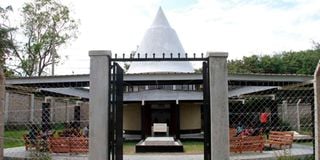Premium
Remembering Tom Mboya

The Tom Mboya Mausoleum at Rusinga Island.
We were spending Christmas on Rusinga Island —the small island in Lake Victoria and across the causeway from Mbita.
Rusinga was the home of Tom Mboya, and we had planned to visit his mausoleum there. What we hadn’t known was that Linda Okatch Mungayaka, the owner of the Wayando Beach Eco Lodge where we were staying, had been a friend of Mboya – through her husband, who was one of the 81 young Kenyans who benefited in the 1960s from the ‘Airlift Africa’ scholarship programme for studies at various United States universities – a programme initiated by Mboya.
Linda showed me her copy of Mboya’s book, Freedom And After, in which he had written: ‘To Linda. For your courage and loyalty and commitment, a token of my appreciation and encouragement. Tom Mboya. 17/3/69.
Note that date. Barely three months later, on July 5,1969, Mboya was gunned down on Government Road in Nairobi – now Moi Avenue. I remember that day. After two years on secondment at the University of Nairobi, my wife and I were having an indulgent last two days staying at the Norfolk Hotel before flying home to the UK. In the dining room there was tension among all the staff. I asked a waiter if there was a problem. ‘Tom Mboya has been killed,’ he said. ‘He has been killed.’
Mboya was a friend of the Adult Studies Centre, where I had been teaching. He had agreed to write a preface to a booklet on African Socialism that I had written with a colleague, Tom Mulusa.
As Minister for Economic Planning and Development, he had introduced the key economic and social policy statement, ‘Sessional Paper No.10: African Socialism and its Application to Planning in Kenya’. The students at the centre had been split in their support for either Mboya’s capitalist-accommodating socialism or Oginga Odinga’s more extreme brand of socialism.
The contrasting ideologies of the Cold War had been debated (though not too loudly) in the centre’s classrooms – sometimes with reference to one of the set books, Animal Farm.
But back to the present … Since there is only one real road on Rusinga – the one that runs right round the island’s circumference – we thought we would have no problem finding the Mboya Mausoleum, especially since Linda told us that it was not far past the luxurious Rusinga Island Lodge, if driving in an anti-clockwise direction from the causeway.
However, there was no sign at the turnoff. I can now tell you that, if you have the chance to visit, it is immediately behind the airstrip and at a turnoff marked Kolunga Beach.
The mausoleum stands on family land, and it is well looked after by younger members of the extended family. Behind the grave, the small museum has a number of photographs, a collection of memorabilia, a cup Mboya won in a dancing competition, and gifts he had received. There is also the briefcase he was carrying when he was assassinated.
I learned a lot about Mboya from the many recorded conversations I had with Sir Michael Blundell to help him with his memoir, A Love Affair With The Sun. Like Blundell, Mboya had the ear of Ian Macleod, the British Secretary of State for the Colonies, who chaired the first of the Lancaster House Conferences that agreed the terms of Kenya’s Independence. Blundell recognised Mboya’s clear thinking, his grasp of the constitutional arguments, and his ability to make a well-reasoned case.
I once said to Blundell that Mboya would have made an excellent Secretary General of the United Nations. ‘That’s amazing you say that,’ Blundell replied. ‘Tom came to see me just a week before he was killed. He felt his way was getting blocked in Kenya. He was considering joining the UN.’
Sadly, Tom Mboya was denied the chance. He could well have become the first African secretary-general.
John Fox is chairman of iDC Email: [email protected]





